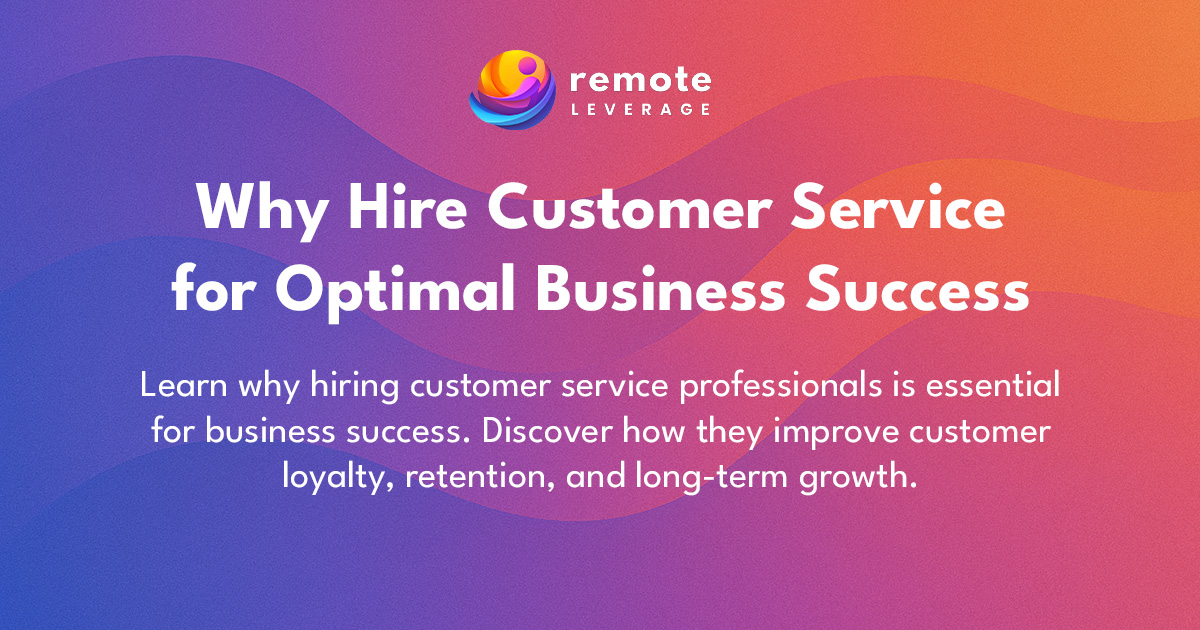
No matter how great your product is or how strong your marketing might be, one thing remains true—your customer experience can make or break your business.
Today’s customers expect fast, helpful, and human support. And if they don’t get it? They’ll leave.
That’s why hiring dedicated customer service support isn’t just a “nice to have”—it’s a critical investment in your business’s growth, reputation, and retention strategy.
In this article, we’ll explore why customer service plays such a powerful role in your long-term success, what happens when you get it right (or wrong), and how to hire the right support for your team.
When most people think of customer service, they imagine someone answering support tickets or dealing with complaints. But real customer service goes far beyond that.
The right support team helps your business:
In other words, great service doesn’t just solve problems—it builds loyalty.
Here’s what the data and real-world results tell us:
1. Customer Retention is Cheaper Than Acquisition
Acquiring a new customer can cost 5 to 7 times more than keeping an existing one. Hiring a great customer service representative pays for itself by reducing churn and increasing repeat purchases.
2. 86% of Buyers Will Pay More for a Better Customer Experience
According to a report from PwC, people are willing to spend more with businesses that offer a better experience. That includes faster response times, helpful agents, and thoughtful follow-ups.
3. Negative Experiences Travel Fast
In today’s digital world, one bad review or viral tweet can hurt your brand. Responsive customer service helps contain issues and turn negative situations into positive testimonials.
4. Happy Customers Become Your Best Marketers
Word-of-mouth referrals and five-star reviews often come from customers who felt taken care of. A great support experience becomes part of your product and marketing strategy.
Let’s be real—delayed responses, generic replies, and poor communication don’t just frustrate customers. They cause real damage.
Here’s what happens when you ignore or underinvest in customer service:
Support is not a back-office task. It’s a front-line growth strategy.
Not sure if now is the right time? Look out for these signs:
If any of these sound familiar, it’s time to bring in support.
Customer service isn’t just about being polite—it’s about solving problems efficiently and making your customers feel seen and heard.
Here’s what to look for in a great customer service hire:
Both options work—it depends on your budget, systems, and growth stage.
In-house is great if you:
Want full-time, brand-dedicated support
Need someone to coordinate directly with product or operations
Have a complex offering or high-ticket product
Outsourcing is great if you:
Want to stay lean without sacrificing responsiveness
Need extended support hours or global coverage
Have a consistent, repeatable support flow that can be trained
💡 Pro tip: Many successful brands start by outsourcing and then bring customer service in-house once the business is more established.
Hiring support is one thing—but setting them up with the right tools and systems is where the magic happens.
Make sure they have:
With the right setup, your customer support rep becomes a powerful extension of your brand.
Great service isn’t just about fixing problems—it’s about creating repeat buyers, brand advocates, and a reputation that sets you apart.
Hiring customer service professionals allows your core team to focus on innovation and strategy, while ensuring that your customers feel valued every step of the way.
Q: Why is customer service important for business success?
Not at all. In fact, small and mid-sized businesses are driving much of the growth in BPO adoption today. With virtual platforms and remote teams, outsourcing is more accessible than ever.
Q: When should I hire a customer service representative?
Yes—if you work with the right providers. Reputable BPO agencies offer clear contracts, data security protocols, and proven talent pools to reduce risk.
Q: What’s the difference between in-house and outsourced customer service?
Start with time-consuming, repeatable tasks such as customer service, admin work, data entry, bookkeeping, lead generation, and calendar management.
Q: Can small businesses benefit from hiring customer support?
Use KPIs like cost savings, task completion rates, response times, and customer satisfaction. With clear metrics and expectations, outsourced teams can be just as accountable as in-house employees.
Q: How much does it cost to hire a virtual customer service representative?
Rates vary based on experience and region. A general VA with customer service experience may cost between $6 to $15 per hour, while more experienced agents or specialized support roles may range from $15 to $35+ per hour.
Q: What tools should a customer service rep be familiar with?
Common platforms include Zendesk, Freshdesk, Gorgias, Help Scout, Intercom, and email/ticketing tools. Familiarity with your CRM, live chat tools, and internal documentation (like Notion or Google Docs) is also helpful.
Q: How do I ensure quality when outsourcing customer service?
Start with a clear onboarding process, provide SOPs and FAQs, use feedback loops to assess performance, and hold regular check-ins. Also, consider trial periods and KPIs to track responsiveness, satisfaction, and resolution times.
At Remote Leverage, we help growing businesses find skilled virtual customer service representatives who fit your tone, tools, and customer expectations. From setup to support, we’ll help you build a team that delivers on your brand promise.
👉 Book a discovery call to find the right support for your business.